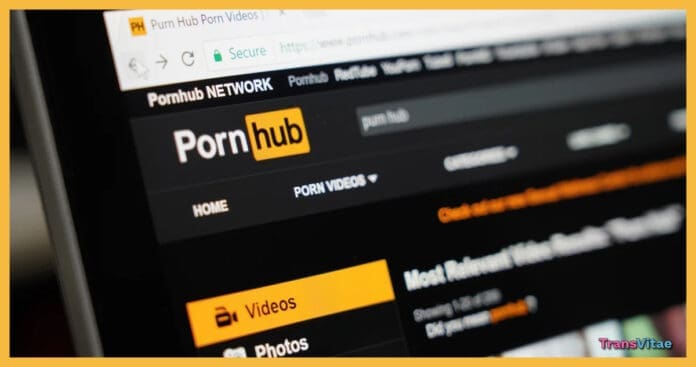This Content Is Only For Paid Subscribers
French fans of Pornhub, YouPorn, and RedTube woke up on June 5 to find their screens covered not in explicit thumbnails but in Delacroix’s Liberty. The banner, splashed across all three sites, declared, “Your government suggests checking your age every time you visit our site, that’s crazy, right?”
The blackout is Aylo’s (the site’s parent company) loudest protest yet against France’s new age-verification regime. Under rules rolled out this spring, every adult platform must confirm users are 18 by collecting a credit card number, passport, or other state-issued ID. To limit data collection, companies are supposed to route those checks through a third-party “double-blind” broker so that neither websites nor the broker see the full picture of a person’s identity. Aylo argues the patchwork still “creates unacceptable security risks” because the very act of matching an ID to porn consumption can be traced or hacked.
French officials insist the shutdown simply proves the law works. Gender Equality Minister Aurore Bergé applauded the self-blocking, calling it “a step toward ending the free buffet of violent porn for kids.” Yet privacy experts accuse the government of outsourcing surveillance and normalizing ID-for-access schemes that could migrate to other parts of the web.
A Transcontinental Trend
If the Liberty banner looks familiar to U.S. readers, that’s because Aylo ran the same message last year when it cut access in Texas and six other states with similar statutes. Texas’s HB 1181 requires any site with more than one-third “sexual material harmful to minors” to verify ages with government ID or “public and private data.” Non-compliant sites face fines up to 10,000 dollars per day and a quarter-million if even one minor slips through.
Attorney General Ken Paxton has been blunt: “Texas has a right to protect its children from the detrimental effects of pornographic content.” After Pornhub shuttered its Texas portal, Paxton’s office claimed victory when the Fifth Circuit Court of Appeals upheld the law, brushing aside First Amendment concerns and dubbing credit-card checks a “rational response.”
The Free Speech Coalition (FSC), an industry trade group that includes thousands of adult performers, many of them LGBTQ and trans creators, is now asking the U.S. Supreme Court to reverse that ruling. Executive Director Alison Boden argues the age-ID requirement chills protected expression, forces people to hand over sensitive data, and threatens the livelihoods of performers who rely on traffic-driven revenue. “We are fighting not only for our community but for the right of all Americans to access legal content in the privacy of their own home,” Boden said.
Louisiana Started It, Europe May Finish It
Louisiana’s 2022 law was the first statewide measure, and it quickly became a template. By early 2025, Arkansas, Mississippi, Montana, North Carolina, Utah, Virginia, and Texas had passed near-copies, with others in committee. The text tweaks matter: one state may let an app verify age with a selfie scan, while another demands a full driver’s license upload. For users who shift between states, like truck drivers, college students, or traveling trans performers trying to monitor their own content, the result is a jarring patchwork of pop-ups, dead links, and personal-data requests.
Europe is moving even faster. The European Commission is investigating adult sites over child-protection compliance, and the United Kingdom plans to activate its own browser-level age gates this July. Aylo’s French blackout foreshadows possible UK or EU-wide bans if governments press ahead without privacy-first tools.
What Trans Viewers and Creators Say
For trans audiences, porn is often more than titillation; it can be a rare window into affirming bodies and pleasure narratives absent from mainstream media. Losing easy, anonymous access hits especially hard in rural areas where queer sexual health resources are scarce. Meanwhile, many trans performers depend on global traffic to survive in a discriminatory job market. When an entire country or state goes dark, so does their income stream.
Creators say they already see drops of 20 percent in tips and clip sales each time a new region blocks access. The blow is compounded by banks that label adult work “high-risk” and refuse accounts, pushing trans entertainers back to underground payment processors with higher fees and fewer safeguards.
The Privacy Puzzle
Regulators counter that age gates are standard in brick-and-mortar spaces; liquor stores, casinos, strip clubs, and the web should be no different. Civil-liberties lawyers respond that showing an ID at a bar leaves no permanent record. Uploading a passport scan to a third-party server does.
Aylo proposes a device-level solution, akin to parental controls baked into phone operating systems. The idea: users verify their age once with Apple, Google, or Microsoft, which then issues a yes-or-no token to any adult site without transmitting personal details. French officials say they are studying such models but need immediate safeguards now.
The Bottom Line
In the United States, the Supreme Court will decide this summer whether Texas’s law survives. A reversal could unwind rules elsewhere. A split decision may leave a messy state-by-state battlefield. In Europe, Aylo and privacy groups hope France’s data-protection watchdog will step in and declare the current ID checks disproportionate under the EU’s privacy regulation.
Either way, the clash underscores a deeper question: can governments protect kids online without building a dragnet that chills adult autonomy, queer expression, and sexual commerce? Until lawmakers, tech giants, and civil rights groups hammer out a privacy-preserving fix, trans users and creators will remain caught between two harms: censorship on one side and forced exposure of their most intimate data on the other.
For now, French visitors will keep seeing Liberty raise the tricolor every time they try to click “Play.” Texans still see a blank page. The battle that started with safeguarding minors has evolved into a debate about the level of privacy that adults must give up to view consenting adults on screen.


